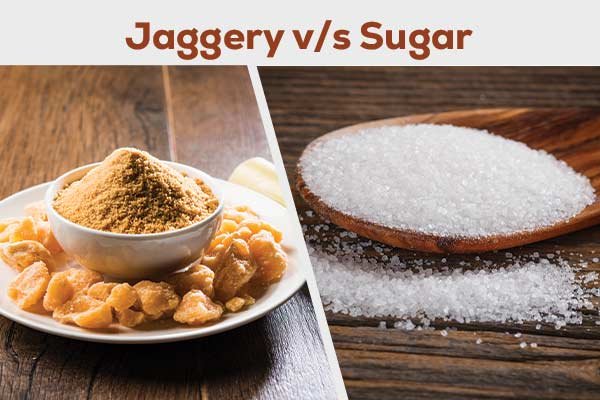Should You Replace Sugar with Jaggery in Your Diet?
Introduction
In the pursuit of healthier dietary choices, many individuals consider alternatives to refined sugar. One such option that has gained popularity is jaggery. This article explores the question: Should you replace sugar with jaggery in your diet?
Understanding Sugar and Jaggery
Before diving into the comparison, it’s essential to understand the basics. Sugar, commonly found as sucrose, is a refined sweetener derived from sugarcane or sugar beets. On the other hand, jaggery, a traditional sweetener in many cultures, is made by concentrating sugarcane juice or sap.
Nutritional Content
When comparing sugar and jaggery, their nutritional profiles differ. Sugar is often considered empty calories, providing sweetness but lacking significant nutrients. In contrast, jaggery retains some of the minerals present in sugarcane, including iron, magnesium, and potassium.
Glycemic Index Consideration
The glycemic index (GI) measures how quickly a food raises blood sugar levels. Sugar has a high GI, causing a rapid spike in blood sugar. Jaggery, while still a sweetener, generally has a lower GI, leading to a slower, more gradual increase in blood sugar levels.
Impact on Weight Management
Excessive sugar consumption has been linked to weight gain and increased risk of chronic diseases. Jaggery, with its slightly lower calorie content and added nutrients, might be perceived as a better alternative. However, moderation remains key, as excessive jaggery intake can contribute to calorie surplus.
Antioxidant Properties
Jaggery contains antioxidants that may help neutralize harmful free radicals in the body. Sugar, being refined, lacks these additional beneficial compounds. Choosing jaggery over sugar could offer some antioxidant benefits.
Digestive Health
Jaggery is known for its digestive properties and is often used to alleviate constipation. The fiber in jaggery, along with its natural composition, may promote better digestion. Refined sugar, with its minimal fiber content, does not offer the same digestive advantages.
Taste and Culinary Considerations
Jaggery has a distinct, caramel-like taste that can enhance the flavor of certain dishes. Its use in traditional recipes is well-established. However, the strong flavor might not be suitable for all culinary applications, and personal preferences play a role in the decision to replace sugar with jaggery.
Conclusion
In conclusion, the decision to replace sugar with jaggery depends on individual health goals, dietary preferences, and overall lifestyle. While jaggery brings some nutritional benefits to the table, moderation remains crucial. Consulting with a healthcare professional or nutritionist can provide personalized guidance based on individual health conditions.
FAQs
- Is jaggery a healthier alternative to sugar?
- Jaggery offers some nutritional benefits and a lower glycemic index compared to sugar. However, moderation is key in any sweetener choice.
- Can jaggery aid in weight management?
- While jaggery has a slightly lower calorie content and added nutrients, it should still be consumed in moderation to avoid excess calorie intake.
- Are there specific culinary considerations when using jaggery?
- Jaggery has a distinct taste that may not suit all dishes. It’s essential to consider personal preferences and the flavor profile of the recipe.
- Does jaggery have any digestive benefits?
- Yes, jaggery is known for its digestive properties and may help alleviate constipation due to its fiber content.
- How can one make an informed decision between sugar and jaggery?
- Consider individual health goals, taste preferences, and dietary needs. Consulting with a healthcare professional or nutritionist can provide personalized advice based on your specific circumstances.





